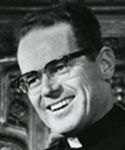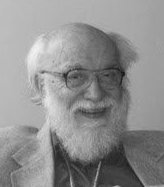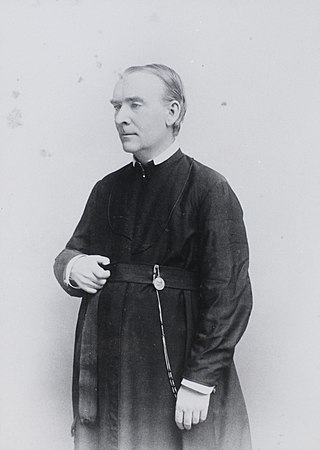Related Research Articles

A conscientious objector is an "individual who has claimed the right to refuse to perform military service" on the grounds of freedom of conscience or religion. The term has also been extended to objecting to working for the military–industrial complex due to a crisis of conscience. In some countries, conscientious objectors are assigned to an alternative civilian service as a substitute for conscription or military service.

Heythrop College, University of London, was a constituent college of the University of London between 1971 and 2018, last located in Kensington Square, London. It comprised the university's specialist faculties of philosophy and theology with social sciences, offering undergraduate and postgraduate degree courses and five specialist institutes and centres to promote research.

Nicholas Paul Wolterstorff is an American philosopher and theologian. He is currently Noah Porter Professor Emeritus of Philosophical Theology at Yale University. A prolific writer with wide-ranging philosophical and theological interests, he has written books on aesthetics, epistemology, political philosophy, philosophy of religion, metaphysics, and philosophy of education. In Faith and Rationality, Wolterstorff, Alvin Plantinga, and William Alston developed and expanded upon a view of religious epistemology that has come to be known as Reformed epistemology. He also helped to establish the journal Faith and Philosophy and the Society of Christian Philosophers.

John Harwood Hick was an England-born philosopher of religion and theologian who taught in the United States for the larger part of his career. In philosophical theology, he made contributions in the areas of theodicy, eschatology, and Christology, and in the philosophy of religion he contributed to the areas of epistemology of religion and religious pluralism.

Edgar Sheffield Brightman was an American philosopher and Christian theologian in the Methodist tradition, associated with Boston University and liberal theology, and promulgated the philosophy known as Boston personalism.
David Braine was a British analytic philosopher with interests in analytic philosophy of religion and metaphysics, who sought to marry the techniques and insights of analytical philosophy and phenomenology to the metaphysics of classical Thomism. His The Reality of Time and the Existence of God set out to prove the existence of God from the fact that the world enjoys continuity in time. He argued that nothing in the world could be the cause of this continuity, whence God came into the picture.

William Charles McInnes Jr., S.J. was an American Jesuit and academic.

George Wolfgang Forell was the Carver Distinguished Chair of Religion in the Department of Religious Studies at the University of Iowa. He was a scholar, author, lecturer, and guest professor in the field of Christian ethics.
The Gloria L. and Charles I. Clough School of Theology and Ministry (CSTM) is a Jesuit school of graduate theology at Boston College. It is an ecclesiastical faculty of theology that trains men and women, both lay and religious, for scholarship and service, especially within the Catholic Church.
Douglas Clyde Macintosh (1877–1948) was a Canadian theologian.
Frederick Pond Ferré was Professor of Philosophy Emeritus at The University of Georgia. He was a past president of the Metaphysical Society of America. Much of his work concerned how metaphysics is entwined with practical questions about how we live our life, including the ethical dimensions of life.
Norbert Max Samuelson was a scholar of Jewish philosophy. He was Professor Emeritus at Arizona State University, having held the Grossman Chair of Jewish Studies there. He wrote 13 books and over 200 articles, with research interests in Jewish philosophy, philosophy and religion, philosophy and science, 20th-century philosophy, and Jewish Aristotelians with an emphasis on Gersonides ; he also lectured at university-level conferences around the world.

John Thomas Noonan Jr. was a United States circuit judge of the United States Court of Appeals for the Ninth Circuit.

Richard De Smet was a Belgian Jesuit priest, and missionary in India. As Indologist he became a renowned Sankara specialist.

David O'Leary is a priest and educator, appointed as a Canon in the Equestrian Order of the Holy Sepulcher of Jerusalem. He is currently serving as the Pastor at Good Shepherd Parish in Wayland, MA. Previously, Reverend O'Leary was Parochial Vicar at Immaculate Conception Parish in Malden, MA. and was also formerly the University Chaplain for Tufts University in Medford, Massachusetts. During his time at Tufts University he was also Senior Lecturer in Religion and Medical Ethics and Chair of the Social, Behavioral and Educational Institutional Review Board.
Rev. David Hollenbach, S.J. is a Jesuit priest, professor, author, and moral theologian currently serving as the Pedro Arrupe Distinguished Research Professor of the Walsh School of Foreign Service at Georgetown University. He is a consultant to the Jesuit Refugee Service and is the recipient of the John Courtney Murray Award from the Catholic Theological Society of America in 1998.

J. Donald Monan, SJ was the chancellor of Boston College from 1996 to 2017 and its 24th president from 1972 to 1996—the longest such tenure in the university's history until it was surpassed by his successor. A native of Blasdell, New York, he joined the Society of Jesus in 1942. Monan earned a bachelor's degree, a licentiate of philosophy, and a Licentiate of Sacred Theology at Woodstock College. He then studied at the University of Louvain (UCLouvain) in Belgium, where he earned a Ph.D. in philosophy. He was ordained a priest in 1955.
Robin Morton Gill is a British Anglican priest, theologian, and academic, specialising in Christian ethics. Since 2012, he has been canon theologian of the Cathedral of the Holy Trinity, Gibraltar: he was acting dean from 2017 to 2020. He was William Leech Professor in Applied Theology at the University of Newcastle (1988–1992), and was then Michael Ramsey Professor of Modern Theology (1992–2011) and Professor of Applied Theology (2011–2014) at the University of Kent. He has also served as a parish priest in the Church of England and the Scottish Episcopal church, serving in the dioceses of Coventry, of Edinburgh, of Newcastle, and of Canterbury.

Edward Ignatius Devitt was a Canadian American priest, Jesuit, and historian of the American Catholic Church. Born in Saint John, New Brunswick, he moved with his family to Boston, Massachusetts, at a young age. He studied in public schools in the city before enrolling at the College of the Holy Cross. Devitt spent two years there, and then entered the Society of Jesus in 1859. He studied at the novitiate in Frederick, Maryland, and at the newly opened Woodstock College. He briefly taught at the Washington Seminary during his studies, and after graduating, was a professor for the next thirty years at Holy Cross, Woodstock, and Georgetown University.
Andrew Joseph Christiansen was an American Jesuit priest and author. He was Distinguished Professor of Ethics and Human Development at the Georgetown University Walsh School of Foreign Service, a senior fellow at the Berkley Center for Religion, Peace, and World Affairs, and the former editor-in-chief of the Jesuit magazine America. His areas of research included nuclear disarmament, nonviolence and just peacemaking, Catholic social teaching, and ecumenical public advocacy.
References
- 1 2 "John J. Paris, S.J. - Theology Department - Boston College". Bc.edu. Retrieved 2014-02-18.
- ↑ Toward an understanding of the Supreme Court's approach to religion in conscientious objector cases (Book, 1972). [WorldCat.org]. OCLC 15911494.
- ↑ "Brophy vs. New England Sinai Hospital, INC". masscases.com. Retrieved 2014-02-25.
- ↑ "John J. Paris, S.J. _ Curriculum Vitae" (PDF). Bc.edu. Retrieved 2014-02-18.